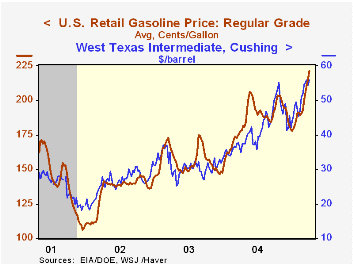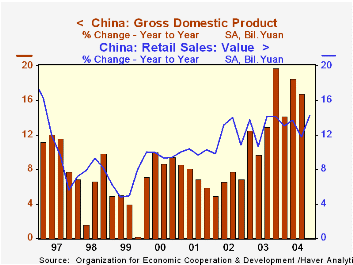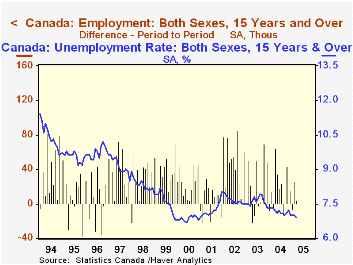 Global| Apr 08 2005
Global| Apr 08 2005$100 For a Barrel of Oil?
by:Tom Moeller
|in:Economy in Brief
Summary
In a recent report the International Monetary Fund echoed the notion posed earlier by a Wall Street brokerage that crude oil could touch $100 per barrel in the foreseeable future. Will The Oil Market Continue To Be Tight? is available [...]
In a recent report the International Monetary Fund echoed the notion posed earlier by a Wall Street brokerage that crude oil could touch $100 per barrel in the foreseeable future. Will The Oil Market Continue To Be Tight? is available here.
The IMF oil price forecast for 2030 is a range of $67 to $96 per barrel in nominal terms (with possible spikes) and is driven by economic growth in China, tight supplies and little spare production capacity. Double digit GDP growth in China has been fueled by 13% growth in consumer spending and sharp expansion of the foreign trade surplus.
In the US, the average price for unleaded regular gasoline rose to a record $2.22 per gallon in the week ended April 4. During the past week futures prices for gasoline declined.
The price of oil also fell last week. West Texas Intermediate crude dropped to $54.00 per barrel versus the earlier high of $57.28.
Wholesale natural gas prices held firm at $7.11/mmbtu (+30.0% y/y), up from $6.13 in February.
For the latest Short Term Energy Outlook from the US Department of Energy click here.

| Energy Prices | 04/04/05 | 12/31/04 | Y/Y | 2004 | 2003 | 2002 |
|---|---|---|---|---|---|---|
| US Retail Gasoline, Regular ($/Gal.) | $2.22 | $1.79 | 24.6% | $1.85 | $1.56 | $1.35 |
| Domestic Spot Market Price: West Texas Intermediate ($/Barrel) | $56.05 | $41.78 | 60.2% | $41.78 | $32.78 | $31.23 |
by By Carol Stone April 8, 2005

The Canadian labor market has shown some further gains early in 2005, as employment has continued rising and the unemployment rate has edged lower.
Employment was up 4,400 in March, following 26,200 February. Both goods and service industries have participated in recent advances, although both sectors have experienced occasional monthly declines.
The unemployment rate was 6.9% last month, down from the 7.0% of the previous three months and the lowest since January 2001. The rate for men was unchanged in March for a third month at 7.3%; the rate for women declined from 6.8% in February to 6.6%. This rate for women is the second lowest ever; the low was 6.4% in June 2000. Reduced labor force participation accounts for some of the recent reduction in women's "unemployment", but employment among women has continued to rise in most months.
Statistics Canada also publishes data on total hours worked. These amounted to 537.1 million in the March survey reference week, almost exactly unchanged from February's total. It is sometimes the case that when the workload increases, employers will lengthen existing workers' schedules rather than hire new workers.That situation seems to hold for Canadians; over the last 10 years, the number of hours per employee has had a negative correlation of 78% with the number of employees. But also evident in the second graph is that since late 2003, both average hours and employment have tended higher. So demand for workers and longer hours have coincided. It is no accident that business productivity has flattened during this time, according to separate StatCan data.
All these data are carried in Haver's "CANSIM" database.
| CANADA Thousands, SA |
Mar 2005 | Feb 2005 | Jan 2005 | December/December||||
|---|---|---|---|---|---|---|---|
| 2004 | 2003 | 2002 | 2001 | ||||
| Employment | +4.4 | +26.6 | -5.7 | +1.4% | +1.8% | +3.9% | +0.3% |
| Goods Producing | +10.8 | -30.3 | +13.1 | +2.0% | -0.5% | +6.3% | -2.9% |
| Services Producing | -6.3 | +56.8 | -18.8 | +1.2% | +2.6% | +3.1% | +1.4% |
| Labor Force | -11.5 | +28.7 | -16.2 | +1.1% | +1.6% | +3.3% | +1.7% |
| Unemployment Rate | 6.9% | 7.0% | 7.0% | Annual Average | |||
| 7.2% | 7.6% | 7.7% | 7.2% | ||||
Tom Moeller
AuthorMore in Author Profile »Prior to joining Haver Analytics in 2000, Mr. Moeller worked as the Economist at Chancellor Capital Management from 1985 to 1999. There, he developed comprehensive economic forecasts and interpreted economic data for equity and fixed income portfolio managers. Also at Chancellor, Mr. Moeller worked as an equity analyst and was responsible for researching and rating companies in the economically sensitive automobile and housing industries for investment in Chancellor’s equity portfolio. Prior to joining Chancellor, Mr. Moeller was an Economist at Citibank from 1979 to 1984. He also analyzed pricing behavior in the metals industry for the Council on Wage and Price Stability in Washington, D.C. In 1999, Mr. Moeller received the award for most accurate forecast from the Forecasters' Club of New York. From 1990 to 1992 he was President of the New York Association for Business Economists. Mr. Moeller earned an M.B.A. in Finance from Fordham University, where he graduated in 1987. He holds a Bachelor of Arts in Economics from George Washington University.
More Economy in Brief
 Global| Feb 05 2026
Global| Feb 05 2026Charts of the Week: Balanced Policy, Resilient Data and AI Narratives
by:Andrew Cates






